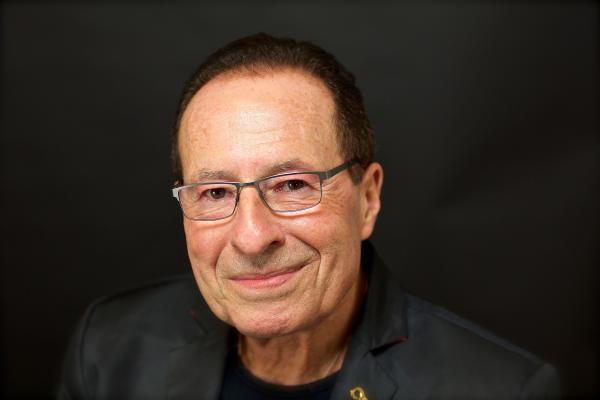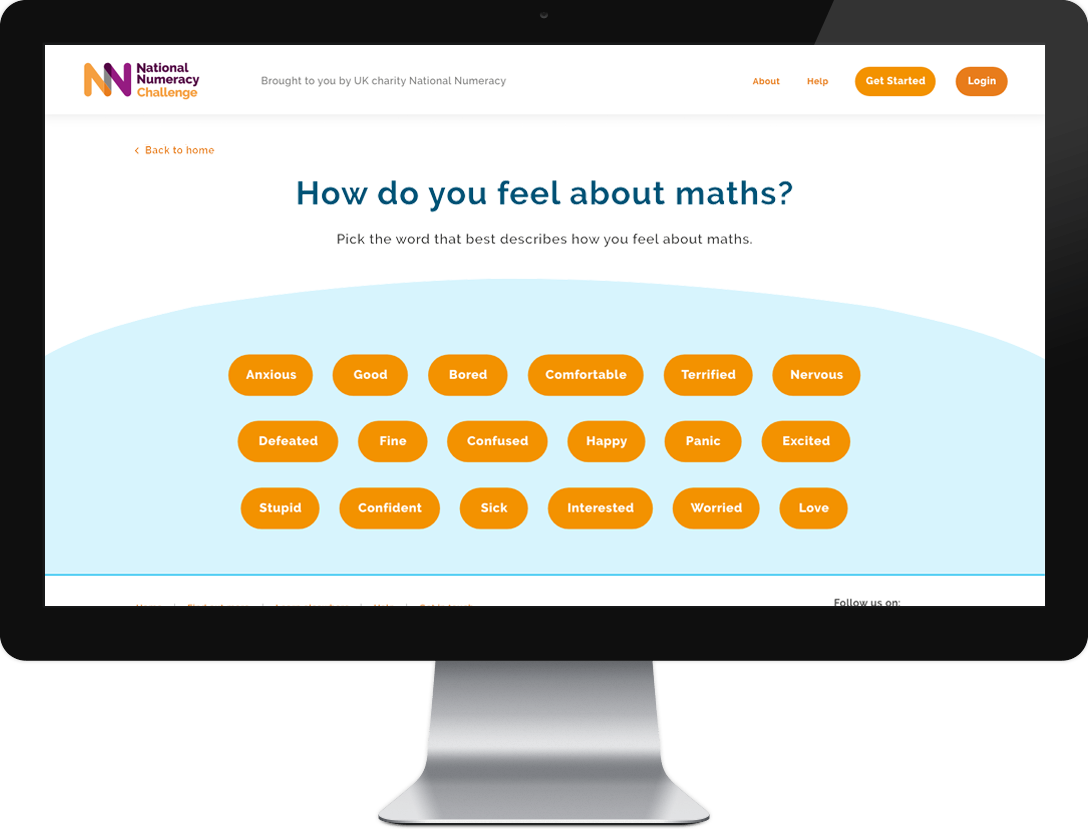However, the creator of the Detective Superintendent Roy Grace novels – now a major TV drama series – finds numbers essential for his work too.
Peter explained why to National Numeracy's Louise Purser in this exclusive 'Big Number Natter' interview for National Numeracy Day.
Creativity and maths are often seen as competing activities. Here, one of the country’s most creative minds talks using maths all the time in his work and life, countering the high-profile narrative that creative people don’t need numbers and ‘number people’ aren’t creative. Everybody needs both, as Peter reveals...
Peter, how do you use numeracy in your work?
When I’m starting a new book – and I’ve done this for years – I set myself a target for each week. I find the first 20 pages are very slow because I go back and back and back, and then as I progress with a book it gets quicker and then towards the end it slows down again.
I’ve just started the twentieth Roy Grace novel, on April 24, so for that Saturday, 29, I put a target of page 5. Then the following week, page 15, then the following week, page 30. Then I go slightly bigger – up to page 50. Every book of mine is around about 450 pages long.
Depending on if it’s a busy week or a quiet week I’ll set myself a target of either 10, 15, 20 or 25 pages. I go through week by week until I get to what I call ‘page 500,’ and that’s the finish. So at the moment, the target for page 500 is November 25. My pages are double spaced and about 250 words.
Each week, if I’m over my target I feel really happy, but if I’m under then I know I’ve got to write more the next week. It really works for me; I can tell where I am every week in terms of the schedule for the book. Numeracy really helps me with keeping on track in terms of scheduled writing.
Are you very strict with your targets?
Very. You have to be. If it runs away, it’s no good, so I have always been very disciplined. I get annoyed with myself if I fall behind. If on the rare times I get ahead of schedule then I’ll readjust the finish date.
I need to deliver the book a good six months before the publication date because the editing process and the proofing will take four to five months. This book I hope to deliver by late November and it will be published at the end of September next year.
I just delivered My Name Is Sandy* last week, which is about Roy Grace’s missing wife, from her perspective, and that will be published in May next year. [*Working title, now called They Thought I Was Dead, published May 2024]
Is there a lot of numeracy involved in planning Grace’s investigations?
I think the biggest numeracy problem I have is the order of events and trying to keep a tight timeframe in the books as I think it adds tension. I’ve often got parallel stories going on so it’s quite complex numeracy in terms of the timelines, and I always get it wrong and have to then go back and work it all out!
In terms of who, what, where, why, and when, timelines are very important in a major crime investigation such as a murder for instance. To some extent it’s all about timelines and who was where and when. When did that person die? This person is a suspect, could she have been at that murder scene at that time? Where was she? When was she last seen by a witness? It’s very much about timelines. Quite often my chapters start with the date, I like to give the reader a guidance. I always draw visual aids such as calendars and charts to help me too.
How do you plan your writing day?
I have a slightly back to front writing day. I started writing when I was working full-time in film and television and made my ‘me’ time 6pm to 8.30pm. That was my best creative time. So usually, I sit down at 6pm with a stiff drink, put on music and then I get in the zone and write until about 8.45pm. Then my wife Lara and I have supper and then watch something on television, or I’ll read.
We’ve got a lot of animals so in the morning, I take the dogs out and feed the whole menagerie. Then I’ll quite often go for a run and then settle down about 10.30am, 11am, and read through what I wrote the night before, edit it and usually expand it. I work until around 1.30pm then Lara and I usually have lunch together.
Then I break in the afternoon and do things like this interview and catch up on emails and I also play tennis three times a week, then I hunker down again at 6pm.
If it’s a really good night I might write 1200 to 1500 words and if I haven’t got to 1000 I get annoyed with myself so I’ll make it up the next day. Usually by the time I’ve edited it’ll come out to about 1200 to 1500 words the next morning.
I’ll try every night to write a minimum of 1000 words, six days a week, but there will be the odd exception if we’re going to a friend’s birthday or something. On Sundays I break, I don’t do anything creative.
How have you used numeracy in your TV, film and stage productions?
With producing, budget is everything. If a director says: ‘I think it’d be quite nice if we had an extra scene there,’ then you’ve got to work out the cost of that.
How did you find maths at school?
I hated it. I was at Charterhouse and they brought in something called ‘new maths,’ which I couldn’t get my head round and I couldn’t even begin to explain to you what new maths is now. I flunked my maths O Level three times, I got it on the fourth attempt.
What really annoyed me – and I think this may be useful for Numeracy Day – is why did nobody at school ever tell me that without mathematics, the table you were sitting at would fall over, or the chair you were sitting in would tilt over, that maths is behind all design?
Everything we see and touch and rely on is there because of mathematics. They never tell you that at school. Planes don’t fall out of the sky because of mathematics. Maths is a massively important dimension of our existence and nobody ever tells you that.
Before I wrote full-time I was involved for a time with my family business, Cornelia James, making the Queen’s gloves. My dad was an old school trained chartered accountant and he could add up eight columns of figures simultaneously, in his head.
It was around 1977 and I was getting involved with sales and I bought a calculator, an early calculator with a little roll that would do a print-out. It cost £28 and he went bananas: ‘What the hell do you need that damn stupid thing for?!’ He thought I had completely and utterly wasted company money. Apparently, accountants like him were trained to do the maths in their heads in the old days.
Do you need maths much in everyday life?
I need it so much because for instance, our house in Jersey is very old, it dates back to 1450 and we’re doing a huge amount of building work. Every day the builders are talking measurements to me about this or that or the other, having to work out the height of the new garage, working out shelves and furniture – maths is involved.
I travel a lot on book promotion around the world, or certainly used to before Covid, not so much at the moment, but there’s foreign currency. I might be in Madrid and I see a pair of shoes I like in a shop and it’s in Euros so I’ve got to then work out what that is in pounds because I only understand it in pounds. I think we use maths all the time.
If you’re driving a car you look at the fuel consumption and immediately you’re thinking: ‘How much is petrol? How much will it cost me to get from home to that particular place, or will it be cheaper to go by bus or train?’
I’m a runner and I run 15, 20 miles a week. I do the odd race and if I’m doing a 10K race, I chunk it down. 10K is six and a bit miles, so when I’ve done two miles, I’ve only got four miles to go and then I go another mile and it’s only three miles so I think of the maths all the time when I’m running.
Also, going to car boot sales has always been a passion of mine. I collect old police memorabilia: hats, badges, police dinky toy cars, almost anything. I love trawling car boot sales for those things.
I use number skills for haggling, but I’m not very good. I’ll give you an example of how crap I am at maths: we were at a charity fundraising auction last week and one of the auction prizes was a £100 discount off a restaurant in Jersey, it’s one of our favourite restaurants. So I bid £300 for it and I’m still trying to work out why I did that. That tells you a lot about my mathematic skills!
Have you ever made any other numeracy mistakes?
The classic was when I wanted to get a new boot scraper. I saw one on Amazon, I did the maths and it looked perfect. It arrived in a delivery vehicle about the size of a double decker bus. It was about 10ft wide and 6ft high. It was for a football stadium! I’d done the calculation and thought it was the perfect size for us. It looked tiny in the picture!
Do you think everyday maths skills and confidence are important and if so, why?
I think they are massively important. We’re constantly having to make decisions around maths. If you’re eating at a new restaurant you want to work out how far it is from you and how long it’s going to take to get there. And of course you look at the menu and the price of things and then it says 15% service. We are having to work out stuff constantly. If you go shopping in the sales and something is 20% off you have to work out the full price. We use numeracy in pretty much everything we do all the time.
I love cooking and you need to get the measures right. With boiling an egg, a quail egg needs two and a half minutes, a medium size hen egg about four and a half and a big hen egg about five. Also, mortgages – that’s vital for people to work out. You could get into a terrible financial mess by getting that wrong.
Thank you Peter!






